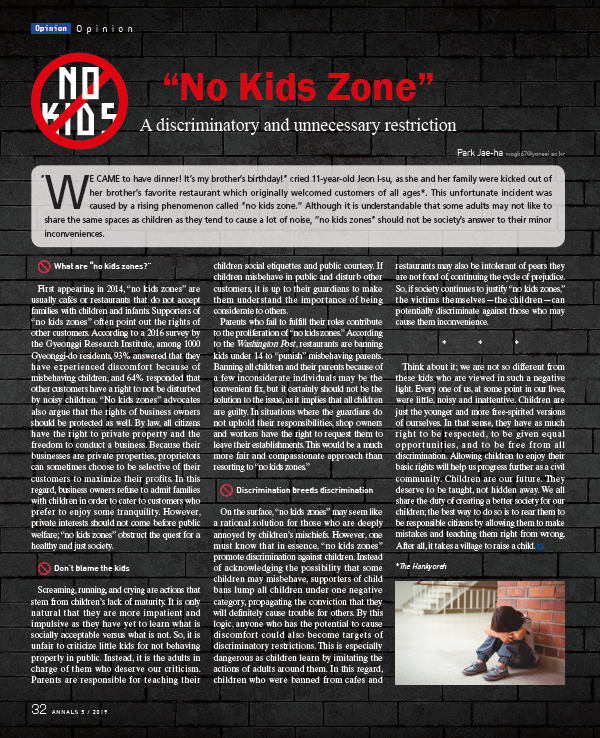A discriminatory and unnecessary restriction

“WE CAME to have dinner! It’s my brother’s birthday!” cried 11-year-old Jeon I-su, as she and her family were kicked out of her brother’s favorite restaurant which originally welcomed customers of all ages*. This unfortunate incident was caused by a rising phenomenon called “no kids zone.” Although it is understandable that some adults may not like to share the same spaces as children as they tend to cause a lot of noise, “no kids zones” should not be society’s answer to their minor inconveniences.
What are “no kids zones?”
First appearing in 2014,“no kids zones” are usually cafés or restaurants that do not accept families with children and infants. Supporters of “no kids zones” often point out the rights of other customers. According to a 2016 survey by the Gyeonggi Research Institute, among 1,000 Gyeonggi-do residents, 93% answered that they have experienced discomfort because of misbehaving children, and 64% responded that other customers have a right to not be disturbed by noisy children. “No kids zones” advocates also argue that the rights of business owners should be protected as well. By law, all citizens have the right to private property and the freedom to conduct a business. Because their businesses are private properties, proprietors can sometimes choose to be selective of their customers to maximize their profits. In this regard, business owners refuse to admit families with children in order to cater to customers who prefer to enjoy some tranquility. However, private interests should not come before public welfare; “no kids zones” obstruct the quest for a healthy and just society.
Don’t blame the kids
Screaming, running, and crying are actions that stem from children’s lack of maturity. It is only natural that they are more impatient and impulsive as they have yet to learn what is socially acceptable versus what is not. So, it is unfair to criticize little kids for not behaving properly in public. Instead, it is the adults in charge of them who deserve our criticism. Parents are responsible for teaching their children social etiquettes and public courtesy. If children misbehave in public and disturb other customers, it is up to their guardians to make them understand the importance of being considerate to others.
Parents who fail to fulfill their roles contribute to the proliferation of “no kids zones.” According to The Washington Post, restaurants are banning kids under 14 to "punish” misbehaving parents. Banning all children and their parents because of a few inconsiderate individuals may be the convenient fix, but it certainly should not be the solution to the issue, as it implies that all children are guilty. In situations where the guardians do not uphold their responsibilities, shop owners and workers have the right to request them to leave their establishments. This would be a much more fair and compassionate approach than resorting to “no kids zones.”
Discrimination breeds discrimination
On the surface, “no kids zones” may seem like a rational solution for those who are deeply annoyed by children’s mischiefs. However, one must know that in essence, “no kids zones” promote discrimination against children. Instead of acknowledging the possibility that some children may misbehave, supporters of child bans lump all children under one negative category, propagating the conviction that they will definitely cause trouble for others. By this logic, anyone who has the potential to cause discomfort could also become targets of discriminatory restrictions. This is especially dangerous as children learn by imitating the actions of adults around them. In this regard, children who were banned from cafes and restaurants may also be intolerant of peers they are not fond of, continuing the cycle of prejudice. So, if society continues to justify “no kids zones,” the victims themselves—the children—can potentially discriminate against those who may cause them inconvenience.
* * *
Think about it; we are not so different from these kids who are viewed in such a negative light. Every one of us, at some point in our lives, were little, noisy and inattentive. Children are just the younger and more free-spirited versions of ourselves. In that sense, they have as much right to be respected, to be given equal opportunities, and to be free from all discrimination. Allowing children to enjoy their basic rights will help us progress further as a civil community. Children are our future. They deserve to be taught, not hidden away. We all share the duty of creating a better society for our children; the best way to do so is to rear them to be responsible citizens by allowing them to make mistakes and teaching them right from wrong. After all, it takes a village to raise a child.
*The Hankyoreh
Park Jae-ha
wogk67@yonsei.ac.kr

